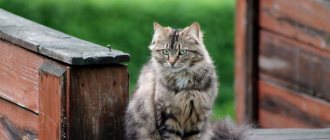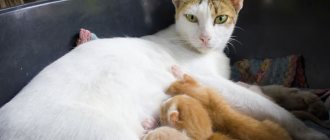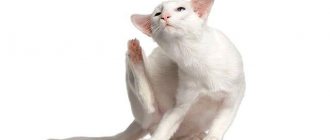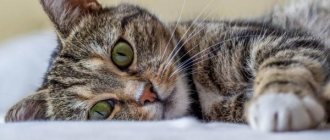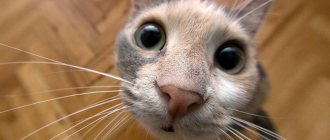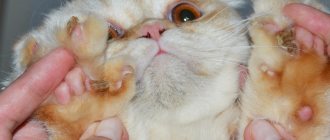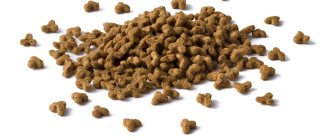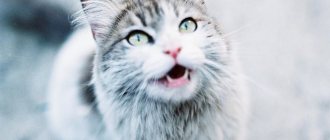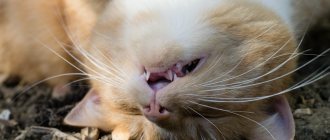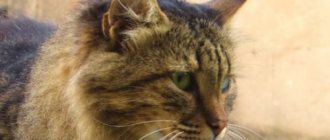9730Administration
Some owners find it very funny that their cat constantly licks itself. But there's not much fun in this. There are often cases where it is better to establish the exact reason for this behavior of your furry pet.
Cats lick their lips due to intense salivation. This does not mean that he is sick, but something is definitely bothering him, he is stressed or uncomfortable. In any case, if a cat constantly licks its lips, you need to observe it for several days and take into account other symptoms, manifestations and its behavior.
Why does a cat constantly lick its tail?
The owners of tailed purrs notice this pathological habit immediately, because it can be terribly annoying, especially if the pet does it near people and even on their bed. You shouldn’t just drive the animal away, as there are many reasons for this behavior. Moreover, they all require contacting a veterinarian. A cat can lick its tail for hours due to:
- allergic reaction to certain foods;
- the presence of parasites in the body (with this disease, the cat will not lick the fur, but directly the anal entrance);
- skin damage on the tail.
A symptom such as licking under the tail often indicates that the pet is under stress. Stress can be caused by the fact that the house has another pet or is undergoing renovations. Constant licking has a calming effect on your furry pet.
Treatment
You need to start by finding out the causes of the phenomenon. If these are medical problems, then they need to be addressed with the help of a veterinarian. You should consult a doctor if your animal regurgitates hairballs too often, licks itself until bald patches form, and various rashes and scratches appear on the skin.
You can help the animal solve psychological problems on your own. There is no need to lock your cat in a small room. If you are going to the country for the summer, take your pet’s house with you. After moving or adding another animal to your home, try to spend a little more time with your pet at first. If you help a cat realize its predator or hunter instinct by playing with it for at least 20 minutes, it will be easier for the animal to cope with stress.
Cats love platforms raised above floor level. They consider them a good place to retreat in case of danger. They can sit on these sites, experiencing moral discomfort. It’s good if you can equip a pet house on one of the sites. If necessary, the cat can retreat and survive stress in a secluded place.
Why does a cat lick its fur in different places, but the animal has no fleas?
The presence of fleas in a pet is the first thing a cat owner thinks about if he notices that he is constantly licking his fur. Even if a quick examination did not reveal parasites in the fur, this does not mean that they are not there. Nits are not so clearly visible; they look like black, very small dots on the skin between the hairs.
However, the cause of constant licking of fur can be not only fleas, but also other skin parasites - scabies mites. It is quite easy to identify them by such signs as the presence of lesions on the skin in the area of the ankles, ears and elbows.
If a cat licks its fur mainly in the summer, but does not have fleas or parasites, there is a possibility that the pet has increased sensitivity to insect bites, such as mosquitoes.
Constant licking of a cat's fur in the absence of parasites may be an initial sign of one of the pathological conditions:
- depriving;
- dermatitis;
- endocrine system disorders;
- otitis;
- skin diseases - demodicosis, pyodermatitis.
All these pathologies, in addition to constant licking, are accompanied by other symptoms - the presence of wounds and erosions on the surface of the skin, areas of severe peeling.
Signs of lichen and fungal infections
Infection of the skin with lichen forces cats to clean their toilets more carefully than usual. If the owner notices that his pet has begun to lick its fur most of the time, you need to carefully examine its skin. If there is lichen on the skin, pockets of erosion or scabs will be visible between the hairs.
With fungus everything is much more complicated.
It is impossible to determine the presence of a fungal infection without examination by a veterinarian and instrumental examination using special equipment.
But there are a number of signs that an attentive owner will notice:
- excessive dry skin;
- the skin in certain areas changes its color, becomes paler or, conversely, stands out excessively, becoming darker or brighter by several tones;
- the appearance of gray scales that separate from the skin;
- the fur becomes thinner.
Similar signs may be present in other skin diseases, so it is not possible to make a diagnosis without a veterinarian.
Dermatitis
Identifying dermatitis in a cat is no less difficult a task than diagnosing a fungal infection. A cat will constantly lick its fur because it suffers from an incessant feeling of itching and burning. One of the most pronounced signs of dermatitis is the presence of inflammatory processes on the skin.
It is almost impossible to determine the presence of dermatitis at an early stage of its development, therefore, if the owner notices that his cat has clearly begun to lick itself longer and more often, it should be immediately shown to a veterinarian.
Otitis
An ear infection is always accompanied by severe itching. The cat will lick itself vigorously, damage its face and ears with its claws, and constantly shake its head. Other signs include redness of the inside of the ear, swelling and pus discharge.
Development of skin diseases
Demodecosis and pyodermitis are pathologies of the skin that are accompanied by severe and constant itching, while the cat experiences severe, ongoing discomfort. Due to the incessant “mange”, the cat begins to lick its fur and sometimes does it so intensely that bald patches appear on the fur.
Reasons why your pet licks itself often
Frequent licking of the entire body may be directly related to the disease. Why a cat licks his lips has its own reason in various ailments. The question is how to recognize, and what to do, and what help to provide to the pet.
Causes:
- change of feed or expired food. Low-quality components can cause allergic reactions in cats. They are accompanied by itching, various manifestations of dermatitis, swelling of the eyes and nose, and lacrimation. In this case, it is necessary to give the cat complete rest, drink plenty of fluids and take him to a veterinary clinic, or call a doctor at home;
- Tailed pets who have reached the age of 5 years may experience dental diseases. At the same time, they salivate copiously and have to swallow it. Also, the gums bleed, there is a putrid odor from the mouth, the animal refuses to eat and is lethargic all the time;
- oxidation of saliva in cats occurs from dysbiosis, gastritis and heartburn. Licking only momentarily prevents symptoms from appearing, but the more she licks, the more pronounced the symptoms become. The cat may sleep all day and becomes weak;
- the presence of a foreign object in the oral cavity. It happens that a small object gets stuck between the teeth, or in the mucous membrane of the oral cavity, and this brings a lot of discomfort. The body secretes a lot of saliva to solve this problem, but only with the help of a person can you get rid of the splinter. Its presence is accompanied by the fact that the cat licks its lips and constantly smacks its lips, it vomits and completely loses its appetite;
- ingestion of a foreign body. Prompt medical attention is needed here. An object that cannot come out naturally becomes a huge threat to the pet’s life;
- poisoning. Intense secretion of saliva is also characteristic of intoxication of the body with any substances. A poisoned mouse, not fresh food, exposure to chemical vapors - all these are causes of poisoning, which are accompanied by vomiting, diarrhea, nausea, restlessness of the pet, and a decrease in body temperature. There may be blood in the stool, the mucous membrane of the eyes turns pale, and in severe cases, convulsions and loss of consciousness;
- pathologies of the digestive system;
- disturbances in the functioning of the kidneys and urogenital bladder.
In any case, constant licking means that a visit to the veterinarian is necessary to get an answer, find out the reason for the pet’s behavior, and provide him with the necessary help.
Licking to the point of baldness
The owner of a purring dog may not even realize that constant, almost non-stop licking of fur is a symptom that the pet is in a state of psycho-emotional instability.
As a rule, all owners are accustomed to the fact that cats lick themselves because they have dermatitis or parasites, but it is also possible that the cat is experiencing real emotional torment. This picture can be observed when an animal needs to mate.
In order to normalize the pet’s condition, after which, accordingly, the bad habit of constantly licking the fur will go away, it is enough to give the cat to drink medications that have a sedative spectrum of action. But it should be borne in mind that they must be taken carefully so that they do not cause side symptoms or addiction in the pet.
The cat licks his lips often
Some owners find it very funny that their cat constantly licks itself.
But there's not much fun in this. There are often cases where it is better to establish the exact reason for this behavior of your furry pet. Cats lick their lips due to intense salivation. This does not mean that he is sick, but something is definitely bothering him, he is stressed or uncomfortable. In any case, if a cat constantly licks its lips, you need to observe it for several days and take into account other symptoms, manifestations and its behavior.
If an unpleasant habit appeared after the castration procedure
The fact that an animal licks itself non-stop after sterilization is a normal, understandable phenomenon. After surgery, when the incision scar begins to heal, this process is accompanied by severe itching and burning. It is not surprising that the cat will try to relieve discomfort by constantly licking the skin.
But it is important for the owner to understand what this can lead to. If the suture is constantly wet after surgery, this will lead to poor and too slow healing and increase the risk of secondary infection.
To protect against negative consequences, the pet is recommended to wear a surgical collar for 10 days after castration, until the suture finally heals.
When to go to the vet
Often owners wait until the last minute. Even when a pet, in addition to licking, has such serious symptoms as frequent regurgitation of balls of hair, damage to the coat, scratching until it bleeds and the presence of a rash, ulcers in the mouth, they ignore it, hoping that it will go away on its own. Why do this is unclear.
An experienced veterinarian will be able to quickly identify the exact cause and prescribe the most effective treatment. Plus, the animal will recover faster, and the owner will breathe easy.
Only a specialist can assess the cat’s condition and choose the right treatment. If there are various additional symptoms, the animal may have to undergo tests, a CT scan or an ultrasound examination. Typically, when treating a symptom of frequent licking, veterinarians take three tests from the animal at once - nipples, blood and urine.
Additional information: as many experts say, even after the problem has been eradicated, cats experience prolonged weaning from the “bad” habit, so you shouldn’t worry about it at first, but it’s better to keep in touch with your doctor.
If a cat begins to lick itself too often and for a long time, then for the pet owner this is a reason to worry and take the animal for examination to a specialist. Frequent licking can be a cause of kidney disease, gastrointestinal tract disease, a sign of allergies, the presence of parasites, dental problems and psychological problems of the pet.
You can identify some of the real causes yourself based on a number of additional signs; however, in some cases, the animal must be shown to a doctor to prescribe appropriate treatment and recommendations for the prevention and care of the cat.
Diagnostic measures
Constant licking of fur is an alarming symptom, indicating that pathological processes are occurring in the animal’s body, often associated with mental instability and severe stress. Therefore, it is recommended to immediately take the cat to the veterinarian to identify the causes of this phenomenon and make an accurate diagnosis.
The veterinarian will conduct a visual examination of the animal and prescribe a number of laboratory tests. If dermatitis, fungal infection or infectious skin diseases are suspected, a bacteriological culture from the affected area is taken. If the doctor suspects that the cat has problems with the functioning of the endocrine system, it will be necessary to take a blood test for hormones.
Prevention
Don't neglect your pet's health. At least once every six months you should take your pet for a full diagnosis.
Stress has a detrimental effect on them. Therefore, try to create comfortable conditions for him and do not neglect sedatives, but only as prescribed by a doctor.
Carry out a visual inspection daily. If he shows signs of illness, he should promptly seek help from specialists.
Stick to a feeding regimen and a properly formulated diet. To do this, you can consult a doctor.
To summarize, we can say that when a cat licks its fur, it does not always indicate the presence of a disease. Clean representatives can lick themselves after being petted. The smell of a person remains on the hands. For their own comfort, they return their smell. In this way, they perceive their surroundings better - smells help them see this world.
Therapeutic measures
Constant licking of fur is not a separate disease, but a symptom of a certain pathology, so treatment is selected individually, depending on the diagnosis:
- If the cause of the symptom is diseases such as allergic reactions to food or hygiene products, local spectrum drugs are prescribed - ointments and creams that eliminate unpleasant symptoms, itching and burning. To prevent allergies from occurring again, you need to determine what exactly was the allergen, otherwise the discomfort will return again. In case of a severe allergic reaction, antihistamines are prescribed for internal use.
- Infections and inflammations on the skin of infectious origin require a course of antibiotics.
- If a fungus has been identified, antifungal medications are prescribed.
Also watch the video why cats lick themselves so often:
Causes of licking and swallowing saliva
As you know, cats sleep most of the time. The active life of an animal is measured approximately 4-6 hours a day. If 30-40% of this time she is engaged in hygiene procedures, then you can be calm, but if the cat licks itself all the time without stopping, then you need to sound the alarm.
The pet often licks itself for no apparent reason
The reasons may be the following.
Nervousness
One of the most common reasons is nervousness. When you live with a pet for more than one year, you can easily notice when it is stressed or tense. This condition is immediately revealed by the eyes and behavior.
In such situations, the cat often licks itself, because this process contributes to the production of a pleasure hormone. The source of increased nervousness of the animal can be a change of food, a change of place of residence, the appearance of new residents, and even a change of filler in the tray.
Attention! The most common sign of stress is the constant twitching of the tip of the tail.
Reflexes
A cat licks on an instinctive level. That is, it is such a reflex.
To avoid paranoia, it is worth clarifying when it is normal for an animal to lick itself:
- After eating and sleeping, licking yourself is a common thing;
- when food is placed in a bowl;
- when the animal wants to drink (if water is freely available, then this is no longer normal);
- when the house is too hot and the cat’s nose is dry, even while sleeping, licking the dry nose a couple of times is in order.
Often a cat will lick its lips after being petted or cuddled by children. Animals do not like foreign smells on their fur, so they try to eliminate it with this procedure.
Attacks of nausea
If your cat constantly swallows saliva and licks his lips, limiting himself only to his face and not his entire body, this may be a sign of nausea.
An example of what ulcerative wounds in a cat's mouth might look like
In this case, you need to watch the animal. See how the cat eats, whether he eats food at all, whether he drinks enough, look around the apartment for signs of regurgitation of fur.
You should also pay attention to your pet's stool. Attacks of nausea are a common sign of diseases in the gastrointestinal tract, the presence of worms, ingestion of foreign objects, and even vascular diseases.
Kidney pathology
If your cat starts licking itself frequently, there may be something wrong with its kidneys.
It is worth noting that the kidneys are the most vulnerable place of most animals, so this is worth paying attention to first. Disturbance in the functioning of these organs can be identified by related signs: loss of appetite, lethargic appearance, weight loss, frequent trips to the toilet in small quantities, the nose and gums turn pale, there are ulcerative wounds in the mouth, burst capillaries in the eyes.
And others
In general, if a cat begins to constantly lick itself, you will most likely have to contact a veterinarian, because in addition to the above reasons, you can additionally voice:
- Poisoning. A poisoned mouse, low-quality food, chemicals stored in places accessible to the cat - all this can cause poisoning and, as a result, the animal begins to drool, eats little, and experiences weakness and lethargy. Sometimes a kitten can lie for a long time without moving, and additionally suffer from nausea, loose stools and high fever, from which the cat can even shake.
- Dental problems. This pet anxiety is quite difficult to identify. Usually, problems with teeth can occur after the age of 5 and, apart from an unpleasant odor from the mouth, no other symptoms are observed.
- Allergies and internal diseases. Often, allergies in animals are accompanied by itching. Because of this, increased salivation occurs, they sleep little, are active a lot and lick themselves with great enthusiasm in the hope of relieving the itching. It is quite difficult to identify an allergen or the presence of a disease that causes an itchy effect. In most cases, it is worth paying attention to a change in food, place of residence (for example, moving to a country house), and new household items (scratching posts often contain toxic materials).
- Claustrophobia. A very rare occurrence, especially for domestic cats, but such cases have also occurred. A closed space provokes the same nervousness and stress.
- Parasites. A very common reason, especially if your pet’s diet includes raw fish and meat. Signs of parasite infection, in addition to licking, are biting, scratching up to open wounds, the presence of nits, worms, itching in the anal area and, most characteristically, foam in the mouth.
As you can see, there can be quite a few reasons for excessive licking. Some are not difficult to identify.
Cats can scratch the itchiest places until they become wounds.
For example, parasite infestation is difficult to confuse with anything else. But if the problem lies in diseases and pathologies of internal organs, then this is a direct route to the veterinary clinic. After all, the same kidney diseases are particularly insidious. They may not reveal themselves for a long time, and then manifest themselves with serious consequences for the pet’s health.
© Dr. Debra Primovic - DVM, 2018
Have you noticed that sometimes a cat starts smacking its lips? Why is she doing this? Typically, such actions cause concern among owners; they try to determine the possible cause. This is especially strange if the cat has not done this before, or if there are other symptoms such as loss of appetite, vomiting, lethargy, weakness and/or diarrhea.
Cats lick themselves quite often. It is clear that some do this more often, others less often. If a cat licks itself very rarely, this should be a cause for concern if it previously groomed its coat well, as stopping grooming could be a sign of illness. If you sometimes make smacking sounds while licking, this is normal. Possible medical or behavioral problems may occur if the smacking becomes too intense and occurs frequently.
Smacking can be caused by a variety of diseases, varying in severity and danger. The most common cause is a disorder that causes nausea or pain in the mouth.
In what cases is it necessary to consult a veterinarian?
If there are some accompanying symptoms, an animal actively licking itself or licking its nose should be shown to a veterinarian. The following signs should not be ignored:
- lethargy and lack of response to external stimuli;
- decrease in physical activity;
- increased body temperature;
- complete or partial loss of interest in food and, accordingly, weight loss;
- deterioration of the coat (thinning or hair loss);
- the appearance of sores and scabs on the skin;
- increased thirst;
- disruption of the digestion process and bowel movements;
- refusal of water;
- signs of intoxication and dehydration of the body;
- frequent vomiting.
You should not treat the animal yourself. Inept actions can aggravate the problem, so it is better to entrust the identification of the cause of the disease and the development of a treatment regimen to a veterinarian.
STRANGE SYMPTOM
My cat seems to be sick. I had been noticing this strange symptom for two weeks already, but it was so subtle, just a little, and I asked with a cat’s smile: “And why are you slurping?” But today I'm no longer laughing. He constantly seems to be trying to swallow saliva, slurps all the time, yesterday his appetite disappeared, he became lethargic, and I even managed to calmly pick him up and hold him, which was simply impossible before. And he started drinking water. He just comes up and drinks water, which he hasn’t done before. Last night, although he was slurping, we still ran after the mouse, but today he doesn’t want anything. And he's chomping with all his might. And when I tried to get into his mouth, it turned out that the saliva was very viscous, just like ointment. Apart from lethargy and loss of appetite, there are no other symptoms. Poops, pees. I'm at a loss, I have a lot of strange versions. Taking it to the doctor is practically not an option. He has only been living in my apartment for a month, an adult, strong, large country cat, all this month in my house he has been angry, aggressive, hissing, and absolutely not tame. And in the clinic he will simply cause chaos, and still will not let anyone touch him. And I'm afraid that he will run away. I explain this for those who will start giving advice - to steal, get tested, etc. I understand this myself. But if anything, that’s only on Monday. What should I do now? Here I am at work late today, and the cat is at home alone.
